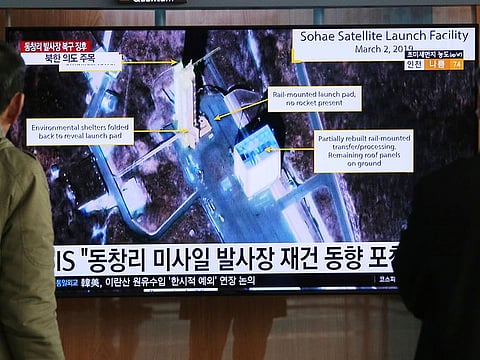North Korea Has Started Rebuilding Key Missile-Test Facilities, Analysts Say
Country is believed to have other fuel-making facilities elsewhere

SEOUL: North Korea has started rebuilding the facilities it uses to launch satellites into orbit and test engines and other technologies for its intercontinental ballistic missile programme, according to US military analysts and South Korean intelligence officials.
The revelation comes days after the breakdown of the second summit meeting between the North’s leader, Kim Jong-un, and President Donald Trump last week in Hanoi, Vietnam. It could be a first sign that North Korea is preparing to end its moratorium on missile tests, which Trump has claimed as a major diplomatic achievement.
North Korea began dismantling the Sohae Satellite Launching Station in Tongchang-ri near its northwestern border with China last summer, after Kim held his first meeting with Trump in June in Singapore. It partially took down an engine test site, a rocket launch pad and a rail-mounted building used by engineers to assemble launch vehicles and move them to the launch pad.
The North did not completely dismantle the facilities, and when Kim met with President Moon Jae-in of South Korea in September, he offered to destroy them in the presence of US experts.
But that offer is now in doubt, after Kim’s meeting with Trump in Hanoi ended without an agreement on how to end the North’s nuclear weapons and missile programmes.
In Hanoi, Kim asked for the removal of punishing UN sanctions in return for the dismantling of its Yongbyon nuclear complex north of Pyongyang, the North’s capital, as well as the Tongchang-ri facilities. Trump rejected the demand, calling the lifting of sanctions too high a price to pay for partial moves toward denuclearisation.
Although the Yongbyon complex has been used to produce nuclear bomb fuel, North Korea is believed to have other fuel-making facilities elsewhere, as well as fissile materials, nuclear warheads and missiles that it keeps in secret locations.
Analysts have wondered what Kim’s next move might be after the breakdown of the Hanoi talks. In a New Year’s Day speech, he warned that North Korea would find a “new way” if the United States persisted with sanctions.
The news of rebuilding at Tongchang-ri emerged hours after Kim returned home Tuesday from Hanoi.
Speaking to lawmakers behind closed doors at South Korea’s National Assembly on Tuesday, officials from its National Intelligence Service indicated that North Korea had been rebuilding the Tongchang-ri facilities even before the Hanoi summit, South Korean news media reported Wednesday.
North Korea may have wanted to rebuild them in order to make their dismantling more dramatic if the Hanoi summit produced a deal with the Americans, the intelligence officials were quoted as saying. Or it may have wanted the option to resume rocket tests if the Hanoi talks broke down, they said.
The intelligence service declined to confirm the South Korean reports Wednesday.
North Korea has not conducted any nuclear or missile tests since November 2017. Trump has cited that as a key achievement of his policy of imposing tough sanctions, which he said forced North Korea to return to the negotiating table.
Speaking at a news conference in Hanoi last week, Trump said Kim had promised not to resume nuclear or missile tests. Later, the United States cancelled two large-scale joint military exercises with South Korea to help support Trump’s diplomacy with Kim.
The Tongchang-ri facilities have been vital to North Korea’s space and missile programmes. The country has used the facilities to launch satellite-carrying rockets. The United States has called the satellite programme a front for developing intercontinental ballistic missiles.
Kim visited the rocket engine test site in 2017 when engineers there successfully tested a new high-thrust engine, which was believed to have powered intercontinental ballistic missiles that the North launched months later.
Reports published Tuesday on the rebuilding at Tongchang-ri were based on satellite images obtained Saturday, but analysts said the work could have begun as early as mid-February.
“Based on commercial satellite imagery, efforts to rebuild these structures started sometime between February 16 and March 2, 2019,” 38 North, a website specialising in North Korea analysis, said in a report about the Tongchang-ri facilities Tuesday.
“On the launch pad, the rail-mounted transfer building is being reassembled,” it said. “At the engine test stand, it appears that the engine support structure is being reassembled.”
Beyond Parallel, a website run by the Washington-based Centre for Strategic and International Studies, published a report with similar assessments Tuesday.
“Commercial satellite imagery acquired on March 2, 2019, shows that North Korea is pursuing a rapid rebuilding of the long-range rocket site,” it said. The renewed activity “may indicate North Korean plans to demonstrate resolve” after the Hanoi summit, it said.
Officially, North Korea says it no longer needs to carry out nuclear or missile tests because it has finished developing its nuclear-capable intercontinental ballistic missiles and begun mass-producing them. But some Western officials and analysts still doubt that the country has mastered the technologies needed to reliably strike a target across an ocean with a missile.
In his Singapore meeting with Trump, Kim made a vague commitment to “work toward complete denuclearisation of the Korean Peninsula.” But the North has since balked at taking specific actions toward dismantling its nuclear and missile programs, criticising what it called Washington’s “unilateral, gangster-like demand for denuclearisation” and insisting that it will not move toward denuclearisation unless the United States takes “corresponding” steps.
—New York Times



